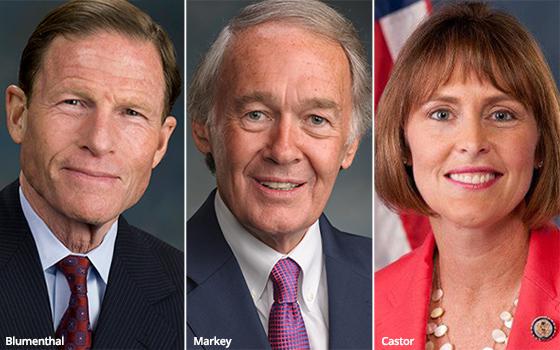
Three Democrats on Thursday
reintroduced a bill that would impose a host of restrictions on websites aimed at users under age the age of 16.
The Kids Internet Design and Safety (KIDS) Act, introduced by Senators Ed Markey (Massachusetts) and Richard Blumenthal (Connecticut) and Rep. Kathy Castor
(Florida), would regulate site design, prohibit the amplification of “harmful” material, and ban “manipulative” marketing techniques.
Among other specific provisions,
the proposed law would prohibit operators of platforms aimed at users 15 and under from using “auto-play” settings on videos, and would ban those operators from sending push alerts to
those users.
The measure would also prohibit websites from recommending unboxing videos, or other types of influencer marketing, to children and younger teens, and would prohibit sites from
recommending content involving nicotine, tobacco, or alcohol to minors under 16.
The bill, initially introduced in March of 2020, was reintroduced the same day the Senate Commerce
Committee held a hearing on Instagram's impact on young users. The hearing was
prompted by a recent report in The Wall Street Journal that
Facebook's internal research showed Instagram is harmful for a “sizable percentage” of teen girls.
The Journal reported that one Facebook research slide read:
“Thirty-two percent of teen girls said that when they felt bad about their bodies, Instagram made them feel worse.”
Blumenthal referred to that research during Thursday's hearing,
at which he blasted the company over its design decisions.
“Facebook knows the destructive consequences that Instagram's design and algorithms are having on our young people and our
society, but it has routinely prioritized its own rapid growth over basic safety for our children,” Blumenthal said.
Facebook's global head of safety, Antigone Davis, countered that the
company's internal research had been misunderstood, and that many teen girls suggested to Facebook researchers that Instagram was beneficial.
“Among those teenage girls who said they had
felt sadness in the past month, 57% said Instagram made things better, and 34% said Instagram had no impact. 9% said Instagram made it worse,” she said in her prepared testimony. “Among those teenage girls who said they had experienced loneliness in the past
month, 51% said Instagram made things better, and 36% said Instagram had no impact. 13% said Instagram made it worse.”